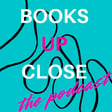
Ep. 2. Andrew McMillan, Pity.
In this episode, we read Andrew McMillan's Pity (2024). Buy the novel from a local independent bookshop, or via Bookshop.org.
Andrew McMillan’s debut collection physical was the only ever poetry collection to win The Guardian First Book Award. The collection also won the Fenton Aldeburgh First Collection Prize, a Somerset Maugham Award (2016), an Eric Gregory Award (2016) and a Northern Writers’ award (2014). It was shortlisted the Dylan Thomas Prize, the Costa Poetry Award, The Sunday Times Young Writer of the Year 2016, the Forward Prize for Best First Collection, the Roehampton Poetry Prize and the Polari First Book Prize. It was a Poetry Book Society Recommendation for Autumn 2015. In 2019 it was voted as one of the top 25 poetry books of the past 25 years by the Booksellers Association. His second collection, playtime, was published by Jonathan Cape in 2018; it was a Poetry Book Society Recommendation for Autumn 2018, a Poetry Book of the Month in both The Observer and The Telegraph, a Poetry Book of the Year in The Sunday Times and won the inaugural Polari Prize. His third collection, pandemonium, was published by Jonathan Cape in 2021, and 100 Queer Poems, the acclaimed anthology he edited with Mary Jean Chan, was published by Vintage in 2022 and was shortlisted for the Books Are My Bag Readers Awards. Physical has been translated into French, Galician, German and Norwegian editions, with a double-edition of physical & playtime published in Slovak in 2022. He is Professor of Contemporary Writing at the Manchester Writing School at Manchester Metropolitan University and is a fellow of the Royal Society of Literature. His debut novel, Pity, was published by Canongate in 2024, and was named as one of the top 20 books of 2024 by The Independent. It has been translated into numerous languages including Norwegian, Swedish, French, German, Turkish and Slovak.
Find the transcript, the extract we discuss, and more about the episode on Substack. Follow the podcast on Instagram.
Please leave feedback here.
Produced, hosted, and edited by Chris Lloyd.
